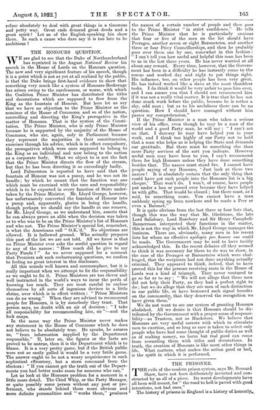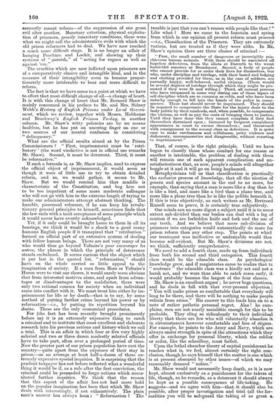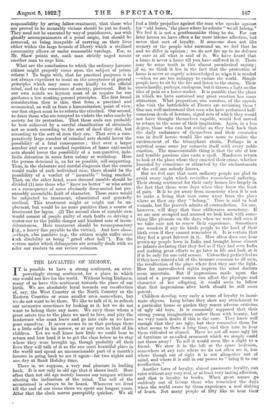THE PRISONER. T HE evils of the modern prison system, says
Mr. Bernard Shaw, have not been deliberately invented and con- structed by Us all of a piece. Its worst developments have all been well meant, for" the road to hell is paved with good intentions, not bad ones." The history of prisons in England is a history of honestly., earnestly meant reform—of the suppression of one gross evil after another. Monetary extortion, physical exploita- tion of prisoners, grossly insanitary conditions, these were what we might call the administrative evils with which the old prison reformers had to deal. We have now reached a much more difficult stage. It is no longer an affair of hanging Peachum and Lockit, and showing up their systems of "garnish," of "acting for rogues as well as against 'em." • The cruelties which are now inflicted upon prisoners are of a comparatively elusive and intangible kind, and in the measure of their intangibility seem to become propor- tionately more intolerable to bear and more difficult to reform.
The fact is that we have come to a point at which we have to effect that most difficult change of all—a change of heart. It is with this change of heart that Mr, Bernard Shaw is . mainly concerned in his preface to Mr. and Mrs. Sidney Webb's. History of English Prisons under Loxil Govern- ment, which we review, together with Messrs. Hobhouse and Brockway's English Prisons To-day, in another column. Mr. Shaw's witty polemics are by no means , faultless, but he has put an unerring finger on one or two sources of our mental confusion in considering "delinquency."
What are the official results aimed at by the Prison , Commissioners ? "First, imprisonment must be ' retri- butory ' (the word vindictive is not in official use remarks Mr. Shaw). Second, it must be deterrent. Third, it must be reformative."
' If such a formula is, as Mr. Shaw implies, used to express the official object of imprisonment, it would seem as- though it were of little use to try to obtain detailed reform, and so, we would gather, it seems to Mr. Shaw. But we would remind him that muddle is characteristic of the Constitution, and beg him not to be too impatient of some more moderate colleague who will not go with him to the extreme length of trying to make our administrators attempt abstract thinking. The humble, piecemeal reformer, if he can keep his revolu- tionary general principles to himself, sometimes finds that the law ends with a tacit acceptance of some principle which it would never have overtly acknowledged. Yet, if it only could be brought home to them in all its bearings, we think it would be a shock to a good many humane English people if it transpired that " retribution ' formed an official part of an extensive system of dealing with fellow human beings. There are not very many of us who would thus go beyond Voltaire's pour encourager lea autles, the phrase in which the principle of deterrence stands embalmed. It seems curious that the object which is put last. in the quoted list, "reformation," should have on the whole carried so little appeal to the imagination of society. If a man from Mars or Voltaire's Huron were to visit our shores, it would surely seem obvious that from interested motives alone, and apart from advan- tages or disadvantages to the malefactor, there were only two rational courses for society when an individual came into conflict with it We must .treat him either by im- prisonment for We or by death—that is to say, by some method of putting further crime beyond his power or by reformation—i.e., by putting its repetition beyond his desire. These are the only economical procedures. For (the fact has been recently brought prominently before us) it is an extremely expensive thing to catch a criminal and to institute that most excellent and elaborate research into his previous actions and historywhich we call a trial. This is an affair in which four or five very highly salaried and two or three dozen modestly salaried officials have to take part, often over a prolonged period of time. Now the greater part of our prison population have cost the oountry—quite apart from the expenses of their stay in prison—on an average at least half-a-dozen of these ex- tremely expensive special inquiries. It is surprising that the prudent taxpayer has not before reflected what a wonderful thing it would be if, as a rule after the first conviction, the criminal could be persuaded to forgo actions which neces- sitated further inquiries. We think that the reason that this aspect of the affair has not had more hold on the popular imagination has been that which Mr. Shaw deals with interestingly, if not exhaustively. The plain man's- answer • has always bean: " Reformation ? The trouble is just that you can't reason.with people like that ! " Like what ? Here we come to the fountain and spring . from which in our opinion all present reform must proceed —i.e., Classification of the Prisoners. They are extremely various, but are treated as if they were alike. In Mr._ Shaw's opinion there are three classes of criminal :— " First, the -small number of dangerous- or- incorrigibly mis- chievous human animals With them should be associated' all hopeless. defectives, from the idiots at Darenth to the worst homicidal maniacs at Broadmoor. Second, a body of people who cannot provide for or order their lives for -themselves, but who, under discipline and tutelage, with their board and lodging and clothing provided for them, as- in the case of soldiers, are normally happy, well-behaved, useful citizens. (There would-. be several degrees of tutelage through which they might be pro- moted if they were fit and willing.)- Third, all normal persons- who have trespassed in some way during one of those lapses of self-discipline which are as ,common as colds, and who have been unlucky enough to fall into the hands of the police in. conse- quence. These last should never be. imprisoned. They should' be required to compensate-the State-for-the injury done to the- body politic by their misdeeds, awl, when possible, to compensate , the victims, as well as pay the costs of bringing them to justice. Until they have done this they cannot complain if they find, themselves distrained upon ; harassed by frequent. compulsory appearances in court- to excuse themselves ; and threatened • with consignment to the second class as defectives. It is quite. easy to make carelessness and selfishness, petty violence and dishonesty, unrerounerative and, disagreeable, without, resorting to imprisonment."
That, of course, is the right _principle. Until we have , begun to classify those whose conduct for one reason or- another is intolerable, the problem of dealing , with them. will remain one of such apparent complication and un-. satisfactoriness that; as now, people's minds. will altogether boggle at it and it will go on being haphazard. Metaphysicians tell us that, classification is practically the exclusive process of knowledge, that all the niceties of' genera and species amount in the end to no more, for- example, than saying that a mania more like a dog than he, is, like a bird, and.more like a bird than a plane tree, and. more like a plane tree than he is like the pebble beneath it. If this is true objectively, as such writers as Mr. Bertrand Russell seem to prove, it is certainly true subjectively.
Our minds can no more digest a subject until it is to some extent sub-divided than our bodies can deal with a leg of mutton if we are forbidden knife and fork and the use of our teeth. And we believe that mere sub-division of prisoners into categories would automatically do more for prison reform than any other step. The points at whicl our treatment was ineffective or undesirable would ther become self-evident. But Mr. Shaw's divisions are not, we think, sufficiently comprehensive.
We need to add a fourth class, made up from individuals from both his second and third categories. This fourth class would be the educable class. As psychological knowledge grew, and if magistrates-came to realize that to: " sentence " the educable class was a kindly act and not a harsh act, and we were thus able to catch cases early, it would probably become the largest of the four classes.
Mr. Shaw is an excellent arguer ; he never begs questions, and he deals in full with that ever-present objection : ." You will 'make prison so comfortable that everybody will 'long to be there, and there will be nothing to make, people, refrain from crime." His answer to this leads him on to a. note of rather pathetic personal regret. Alas ! he corn-- plains, men are not nearly soeialikic, enough for this to be, probable. They cling so ridiculously to their individual liberty that there are few who will voluntarily abandon it: in circumstances however comfortable and free of stigma. For example, he points to the Army and Navy, which are- always under strength in spite of the attractions which they offer in exchange for- personal liberty, which the soldier- or sailor, like the schoolboy, must forfeit.
Upon the lethal chamber theory of capital.punishment reaches what is, we feel, almost certainly the right: con-. elusion, though he says himself that the matter is one which, is at present obscured by other issues--of which we may . reasonably demand "notice."
Mr. Shaw would not necessarily keep death, as it is now kept, almost exclusively as a punishment for the -takers of, life, though, as he remarks; as a deterrent it should always be kept as- a possible consequence of life-taking. He suggests—and we agree with him that it should also be possible, after proper investigation and trial (all the-for- malities you will to safeguard the taking of so great 4. responsibility by .erring fellow-creatures), that those who are proved to he incurably vicious should be put to death. They need not be executed by way of punishment, nor with ghastly accompaniments of a penal origin, but should be removed, as being incapable of carrying on their lives either within the large bounds of liberty which a civilized community allows or under reasonable tutelage. For, as Air. Shaw points out, each man strictly caged means another man to cage him.
. What are the conclusions to which the ordinary humane citizen might properly come upon the subject of prison reform ? To begin with, that for practical purposes it is not always expedient to insist on the acceptance of general principles which may come more kindly to the official mind, and to the conscience of society, piecemeal. But in our own minds we laymen most of us require for our guidance a few working general principles. The first broad consideration then is this, that from a practical and economical, as well as from a humanitarian, point of view, our first object must be to reform the criminal. Our second, to deter those who are tempted to violate the rules made by society for its protection. That these ends can probably be best achieved by a careful classification of criminals, not so much according to the sort of deed they did, but according to the sort of men they are. That over a com- paratively large number of criminal acts should hover the possibility of a fatal consequence ; that over a larger number and over a marked repetition of lesser anti-social acts should hover the possibility of a non-punitive, inde- finite detention in some farm colony or workshop. Here the person detained is, as far as possible, self-supporting. Thus, in the elaborate and careful diagnosis that the courts -would make of each individual case, there should be the possibility of a verdict of " incurable " being reached. That, on the other hand, eases deemed curable should be divided (1) into those who "knew no better" or who acted as a consequence of some obviously deep-seated but pre- sumably amendable fault of character. These cases would • be subjected to treatment, educational and generally medical. This treatment might or might not be un- pleasant, but would be no more punitive than a course of treatment for lupus. (2) The second class of curable case would consist of people guilty of such faults as driving a motor-car to the public danger and kindred acts of incon- siderateness. Here treatment should be recompensatory (.3.g., a heavy fine payable to the victim). And here alone, • perhaps, also punitive (e.g., the citizen might suffer some sich disability as being "gated after hall "). For the system under which delinquents are actually dealt with we refer our readers to our review columns.




































 Previous page
Previous page